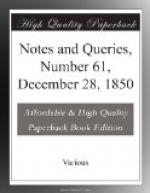Ribolt kills her father and her two eldest brothers, and then Guldborg can no longer restrain herself:
“Hald, hald, my Ribolt,
dearest mine,
Now belt thy brand,
for its ’mair nor time.
My youngest brother
ye spare, O spare,
To my mither the dowie
news to bear.”
But she has broken her lover’s mysterious caution, and he is mortally wounded in consequence:
“When Ribolt’s
name she named that stound,
’Twas then that he gat
his deadly wound.”
In the Scottish ballad, no such caution is given; nor is the lady’s calling on her lover’s name at all alluded to as being the cause of his death. It is so, however, as in the Danish version:
“She held his steed
in her milk-white hand,
And never
shed one tear,
Until that she saw her
seven brethren fa’,
And her
father hard fighting, who loved her so dear.
“O hold your hand, Lord
William, she said,
For your
strokes they are wondrous sair;
True lovers I can get
many a ane,
But a father
I can never get mair.”
There is no note in the Kaempe Viser, says Mr. Jamieson, on this subject; nor does he attempt to explain it himself. It has, however, a clear reference to a very curious Northern superstition.
Thorkelin, in the essay on the Berserkir, appended to his edition of the Kristni-Saga, tells us that an old name of the Berserk frenzy was hamremmi, i.e., strength acquired from another or strange body, because it was anciently believed that the persons who were liable to this frenzy were mysteriously endowed, during its accesses, with a strange body of unearthly strength. If, however, the Berserk was called on by his own name, he lost his mysterious form, and his ordinary strength alone remained. Thus it happens in the Svarfdaela Saga:
“Gris called aloud to Klanfi, and said, ’Klanfi, Klanfi! keep a fair measure,’ and instantly the strength which Klanfi had got in his rage, failed him; so that now he could not even lift the beam with which he had been fighting.”
It is clear, therefore, continues Thorkelin, that the state of men labouring under the Berserk frenzy was held by some, at least, to resemble that of those, who, whilst their own body lay at home apparently dead or asleep, wandered under other forms into distant places and countries. Such wanderings were called hamfarir by the old northmen; and were held to be only capable of performance by those who had attained the very utmost skill in magic.
Richard John king.
* * * * *




